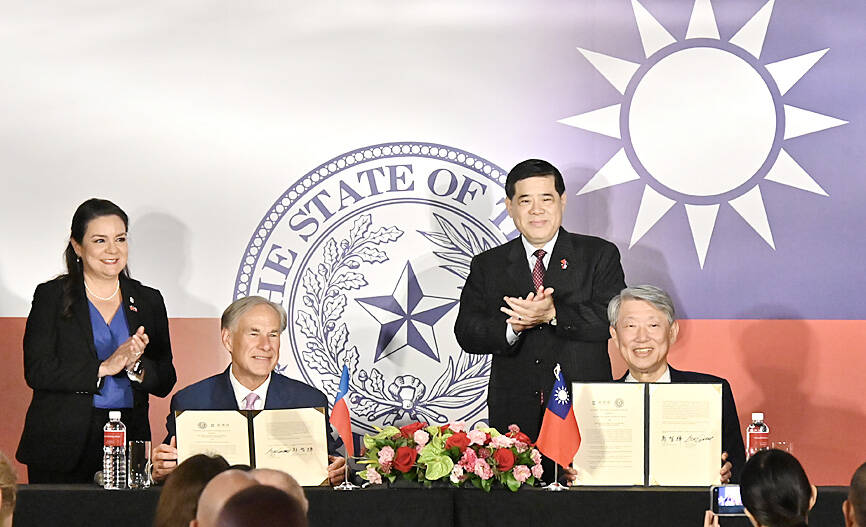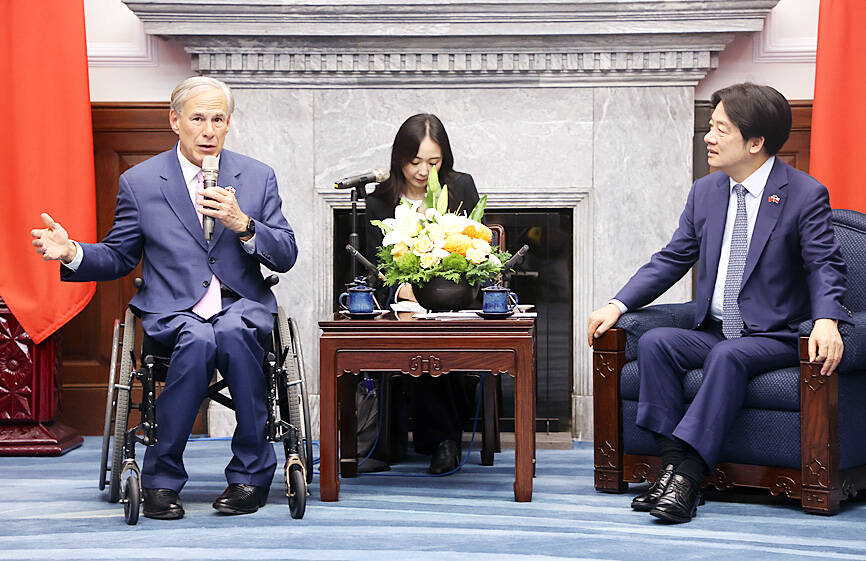Visiting Texas Governor Greg Abbott yesterday announced the opening of a state trade office in downtown Taipei to enhance cooperation and show that “Texas stands with Taiwan.”
The State of Texas Taiwan Office is the second foreign office Texas has opened in the 21st century after Mexico, Abbott told a news conference in Taipei.
“It shows that other than our geographic neighbor, Texas understands the importance of establishing an office in the country of Taiwan,” he said.

Photo: George Tsorng, Taipei Times
“It is incredibly important that Texas shows solidarity with Taiwan, not just for the businesses of Taiwan and Texas — it is important for the entire world to know Texas stands with Taiwan,” Abbott said.
“Because of the size of the Texas economy, it [the office] will be a beacon across the entire globe about a state and a country showing the importance of the relationship between Texas and Taiwan,” he said.
“Knowing that the stronger Taiwan is economically, the more it will be able to indefinitely chart its own future is very important for the future of the entire world,” he added.

Photo: CNA
Abbott made the announcement after signing an Economic Development Statement of Intent with Taiwan Minister of Economic Affairs Kuo Jyh-huei (郭智輝) to boost economic ties at the same event.
In a speech before signing the statement of intent, Kou said that under the deal, Taiwan would continue to expand trade and investment in Texas to help Taiwanese businesses establish a solid foothold overseas and boost supply chain resilience.
Abbott said the deal would further bolster economic bonds between Texas and Taiwan, expand trade and job creation and promote collaboration in semiconductors and energy resilience.
Earlier yesterday, Abbott met with President William Lai (賴清德) in the Presidential Office in Taipei.
Lai said that Abbott was one of the first US leaders to issue a congratulatory message to him after his presidential election victory in January.
Many Taiwanese enterprises have for decades invested in Texas, with total investment exceeding US$12 billion, Lai said.
His administration is promoting Taiwan’s five trusted industry sectors — semiconductors, artificial intelligence, the military, security and surveillance, and next-generation communications — which would result in closer links with industrial clusters in Texas, Lai said.
The Texas office is expected to become a firm pillar of friendship between Taiwan, Texas and the US, making the Taiwan-US partnership even stronger, Lai added.
Abbott’s economic development delegation arrived in Taiwan on Saturday.
The visit is part of a larger trip to the Indo-Pacific region that also includes South Korea and Japan, during which the governor would meet with “businesses and government leaders to drive forward progress in industries critical to the future of the global economy,” the state government said in a news release.
The delegation is scheduled to return to the US on Saturday.

SECURITY: As China is ‘reshaping’ Hong Kong’s population, Taiwan must raise the eligibility threshold for applications from Hong Kongers, Chiu Chui-cheng said When Hong Kong and Macau citizens apply for residency in Taiwan, it would be under a new category that includes a “national security observation period,” Mainland Affairs Council (MAC) Minister Chiu Chui-cheng (邱垂正) said yesterday. President William Lai (賴清德) on March 13 announced 17 strategies to counter China’s aggression toward Taiwan, including incorporating national security considerations into the review process for residency applications from Hong Kong and Macau citizens. The situation in Hong Kong is constantly changing, Chiu said to media yesterday on the sidelines of the Taipei Technology Run hosted by the Taipei Neihu Technology Park Development Association. With

A US Marine Corps regiment equipped with Naval Strike Missiles (NSM) is set to participate in the upcoming Balikatan 25 exercise in the Luzon Strait, marking the system’s first-ever deployment in the Philippines. US and Philippine officials have separately confirmed that the Navy Marine Expeditionary Ship Interdiction System (NMESIS) — the mobile launch platform for the Naval Strike Missile — would take part in the joint exercise. The missiles are being deployed to “a strategic first island chain chokepoint” in the waters between Taiwan proper and the Philippines, US-based Naval News reported. “The Luzon Strait and Bashi Channel represent a critical access

‘FORM OF PROTEST’: The German Institute Taipei said it was ‘shocked’ to see Nazi symbolism used in connection with political aims as it condemned the incident Sung Chien-liang (宋建樑), who led efforts to recall Democratic Progressive Party (DPP) Legislator Lee Kun-cheng (李坤城), was released on bail of NT$80,000 yesterday amid an outcry over a Nazi armband he wore to questioning the night before. Sung arrived at the New Taipei City District Prosecutors’ Office for questioning in a recall petition forgery case on Tuesday night wearing a red armband bearing a swastika, carrying a copy of Adolf Hitler’s Mein Kampf and giving a Nazi salute. Sung left the building at 1:15am without the armband and apparently covering the book with a coat. This is a serious international scandal and Chinese

COUNTERINTELLIGENCE TRAINING: The ministry said 87.5 percent of the apprehended Chinese agents were reported by service members they tried to lure into becoming spies Taiwanese organized crime, illegal money lenders, temples and civic groups are complicit in Beijing’s infiltration of the armed forces, the Ministry of National Defense (MND) said in a report yesterday. Retired service members who had been turned to Beijing’s cause mainly relied on those channels to infiltrate the Taiwanese military, according to the report to be submitted to lawmakers ahead of tomorrow’s hearing on Chinese espionage in the military. Chinese intelligence typically used blackmail, Internet-based communications, bribery or debts to loan sharks to leverage active service personnel to do its bidding, it said. China’s main goals are to collect intelligence, and develop a